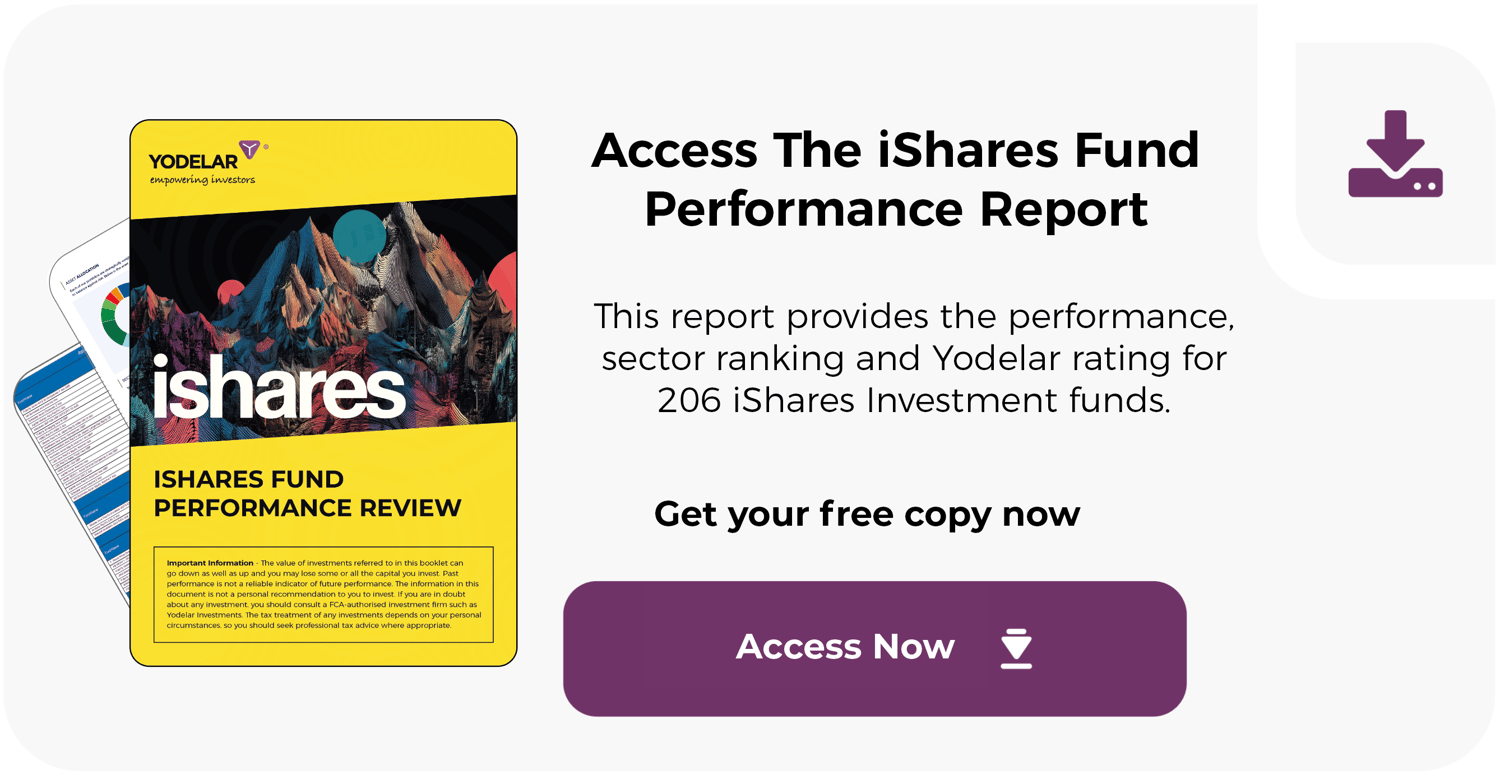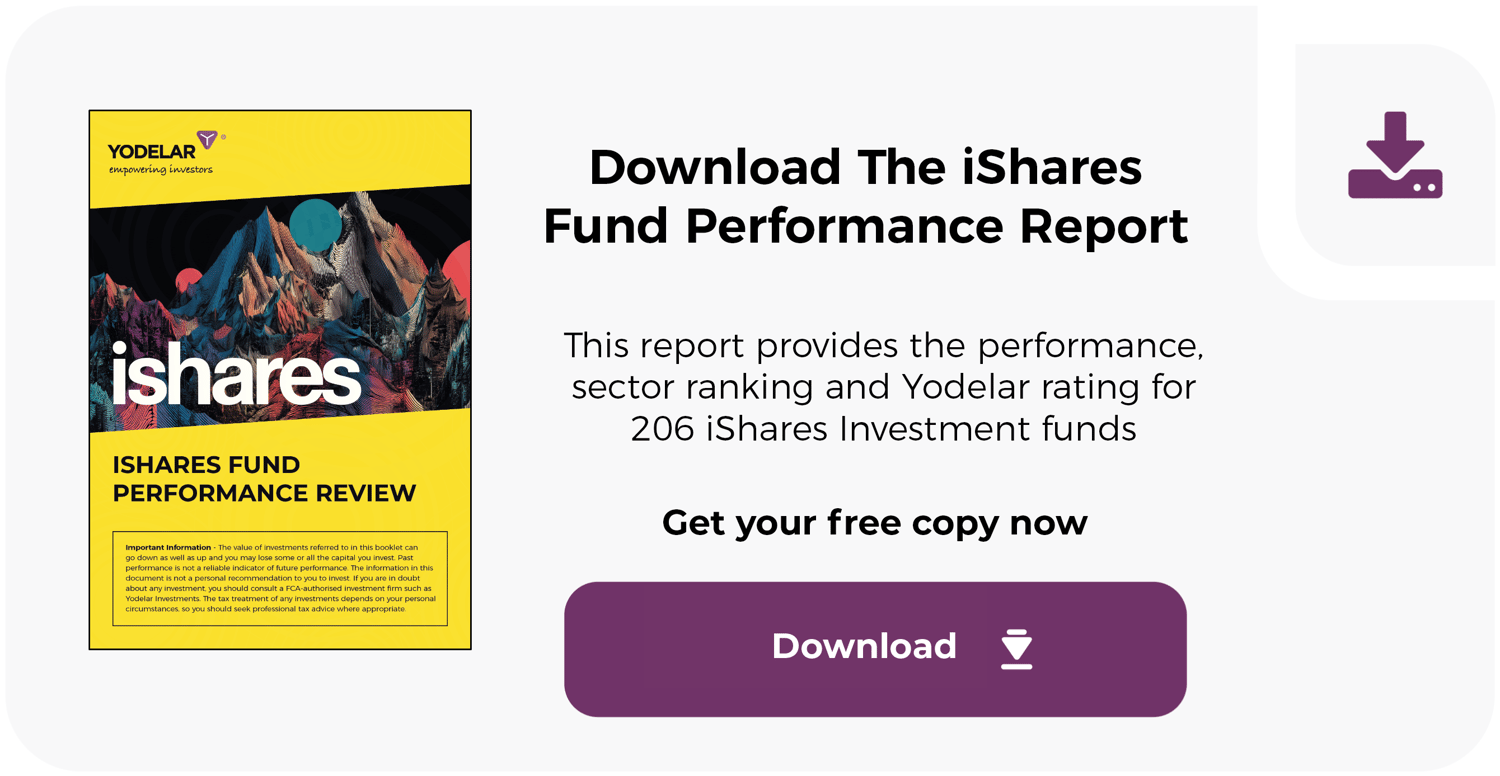-
Our analysis reviewed 206 iShares funds, each measured over 1, 3, and 5 years against their respective Investment Association (IA) sector averages.
-
Of the funds analysed, 37 achieved a 4 or 5-star Yodelar Rating, reflecting consistent above-average returns across multiple timeframes.
-
125 funds — accounting for more than 60% of those assessed — received a 1 or 2-star rating, indicating results below their sector averages.
-
The iShares Edge MSCI Europe Value Factor ETF delivered strong results, returning 109.19% over 5 years compared with 62.16% for its sector.
-
The iShares Gold Producers ETF ranked among the top performers globally, supported by higher commodity prices and strong returns from gold producers.
iShares is the exchange-traded fund (ETF) division of BlackRock and one of the most established names in global asset management. Since its launch in 1996, it has grown to become the world’s largest ETF provider, overseeing more than £2 trillion in assets across a broad range of markets.
Today, iShares manages one of the most diverse collections of funds available, covering global equities, fixed income, commodities, and ESG-focused strategies. Its ETFs are designed to track major market indices, giving investors transparent and cost-efficient exposure to a wide variety of regions and asset classes.
As a pioneer of index-based investing, iShares has helped shape the evolution of the global ETF market. Its focus on accessibility and precision has made ETFs a core component of modern portfolio construction, allowing investors to build diversification efficiently and manage exposure across different market environments.
In this review, we analyse the performance of 206 iShares funds and identify the 10 that have delivered the strongest results over the past 1, 3, and 5 years relative to their sector averages. This analysis highlights where iShares has achieved its most consistent results and the trends shaping performance across regions and sectors within the ETF universe.
iShares Fund Performance Summary
Our analysis reviewed 206 iShares funds, assessing returns and sector rankings across 1, 3, and 5-year timeframes. Each fund was assigned a Yodelar rating based on its performance relative to sector averages.

Of the funds analysed, 37 achieved a 4 or 5-star rating, reflecting consistent above-average results over multiple periods. In contrast, 125 funds - accounting for more than 60% of the range - received a 1 or 2-star rating, indicating results that were below their respective sector averages.
This variation highlights the breadth of outcomes across the iShares range and underlines the importance of reviewing individual fund performance rather than assuming uniform results within any provider’s product suite.
Top-Performing iShares Funds
From the full analysis, 37 iShares funds achieved a 4 or 5-star Yodelar Rating.
The 10 funds featured below represent some of the best performers across 1, 3, and 5-year periods, each maintaining a strong record of returns relative to sector peers.


iShares Edge MSCI Europe Value Factor UCITS ETF
The iShares Edge MSCI Europe Value Factor UCITS ETF has produced strong results within the IA Europe Including UK sector. Over one year, it returned 24.85% compared with a sector average of 9.42%. Over three years, it returned 63.18% versus 44.86%, and over five years, it returned 109.19% compared with 62.16%.
The fund tracks the MSCI Europe Enhanced Value Index, targeting companies across developed European markets that trade at attractive valuations. With a low ongoing charge of 0.25%, the fund offers cost-efficient access to a diversified portfolio of established value-focused European equities.
iShares Gold Producers UCITS ETF
The iShares Gold Producers UCITS ETF has been one of the strongest performers within the IA Global sector. Over one year, it returned 82.27% compared with a sector average of 11.16%. Over three years, it returned 187.47% versus 35.47%, and over five years, it returned 92.56% compared with 62.22%.
Performance has been supported by higher gold prices, resilient commodity demand, and investor interest in inflation-sensitive assets. The fund tracks the S&P Commodity Producers Gold Index, providing exposure to major global gold mining and production companies, including leading Canadian producers.
iShares Core MSCI World UCITS ETF Acc
The iShares Core MSCI World UCITS ETF Acc has consistently delivered above-average results within the IA Global sector. Over one year, it returned 16.31% compared with a sector average of 11.16%. Over three years, it returned 49.52% versus 35.47%, and over five years, it returned 88.10% compared with 62.22%.
Tracking the MSCI World Index, the fund provides broad exposure to large and mid-cap companies across 23 developed markets. With an OCF of 0.20% and approximately £97.35 billion under management, it is among the largest and lowest-cost global equity ETFs available.
iShares MSCI World UCITS ETF
The iShares MSCI World UCITS ETF follows the same index as its Core variant but with a higher ongoing charge of 0.50% and assets of around £6.79 billion. It has maintained a similar pattern of strong results, returning 15.99% over one year compared with a sector average of 11.16%. Over three years, it returned 48.29% versus 35.47%, and over five years, it returned 85.30% compared with 62.22%. The fund’s largest allocations are to U.S., Japanese, and U.K. equities, with technology and financial holdings driving much of its growth.
iShares S&P 500 Financials Sector UCITS ETF
The iShares S&P 500 Financials Sector UCITS ETF tracks an index of major U.S. financial institutions. Over one year, it returned 20.68% compared with a sector average of 13.01%. Over three years, it returned 47.66% versus 41.12%, and over five years, it returned 132.88% compared with 83.24%.
Recent returns have been influenced by steady earnings growth in the U.S. banking sector and improving balance sheet strength. Its passive structure provides focused exposure to the financial services industry at lower cost relative to actively managed alternatives.
iShares MSCI USA Screened UCITS ETF Acc
The iShares MSCI USA Screened UCITS ETF Acc has maintained a strong record of performance within the IA North America sector. Over one year, it returned 18.10% compared with 13.01% for the sector. Over three years, it returned 56.51% versus 41.12%, and over five years, it returned 105.82% compared with 83.24%.
The fund tracks the MSCI USA ESG Screened Index, which excludes companies involved in activities such as weapons, tobacco, and fossil fuels. With a low OCF and consistent results, it provides exposure to leading U.S. companies with additional ESG screening criteria.
iShares MSCI Taiwan UCITS ETF
The iShares MSCI Taiwan UCITS ETF has been a consistent top performer within the IA Specialist sector. Over one year, it returned 22.37% compared with a sector average of 14.80%. Over three years, it returned 69.45% versus 32.00%, and over five years, it returned 112.58% compared with 44.71%.
The fund tracks the MSCI Taiwan 20/35 Index, offering exposure to large and mid-cap Taiwanese companies. With a concentration in technology and manufacturing, key holdings such as TSMC and MediaTek have supported strong returns over time.
iShares S&P 500 Information Technology Sector UCITS ETF
The iShares S&P 500 Information Technology Sector UCITS ETF has delivered strong and sustained results within the IA Tech & Innovation sector. Over one year, it returned 26.00% compared with a sector average of 25.45%. Over three years, it returned 112.13% versus 79.60%, and over five years, it returned 170.36% compared with 86.36%.
The fund tracks the S&P 500 Information Technology Sector Index, providing exposure to leading global technology companies including Apple, Microsoft, and NVIDIA. Its passive structure enables efficient access to the long-term growth of the U.S. technology sector.
iShares 100 UK Equity Index (UK) D Acc
The iShares 100 UK Equity Index (UK) D Acc tracks the FTSE 100 Index, which represents the largest companies listed in the UK. Over one year, it returned 15.49% compared with a sector average of 8.31%. Over three years, it returned 47.99% versus 36.54%, and over five years, it returned 92.66% compared with 61.77%.
With an OCF of 0.07%, the fund provides cost-efficient access to a diversified selection of leading U.K. companies across sectors including energy, financials, and consumer goods.
iShares UK Dividend UCITS ETF
The iShares UK Dividend UCITS ETF tracks an index of 50 U.K.-listed companies with the highest dividend yields. Over one year, it returned 16.78% compared with a sector average of 9.58%. Over three years, it returned 52.75% versus 40.75%, and over five years, it returned 107.85% compared with 78.83%.
Its focus on established dividend-paying companies across the financial, utilities, and consumer goods sectors has supported strong income generation and steady capital growth over recent years.
Summary
Our review of 206 iShares funds shows wide variation in results across the range. While 37 funds achieved a 4 or 5-star Yodelar Rating based on strong and consistent performance, over 60% delivered below-average results relative to sector peers.
The 10 funds highlighted above represent those that have maintained strong comparative results over multiple timeframes. Each has achieved sustained returns that placed them within the upper quartile of their respective sectors.
Diversification and Oversight: The Foundation of Long-Term Success
The varied results across the iShares fund range underline the importance of viewing each holding within the context of a broader portfolio strategy. No individual fund or provider can lead in every market environment, and performance will always vary between regions, sectors, and investment styles.
A resilient portfolio depends on diversification, regular review, and an understanding of how each holding contributes to overall outcomes. Maintaining this structure helps ensure portfolios remain balanced through changing market conditions.
Long-term success relies on process and discipline rather than short-term fund selection. Regular analysis and structured management allow portfolios to adapt over time, supporting steady progress toward investment goals.

















